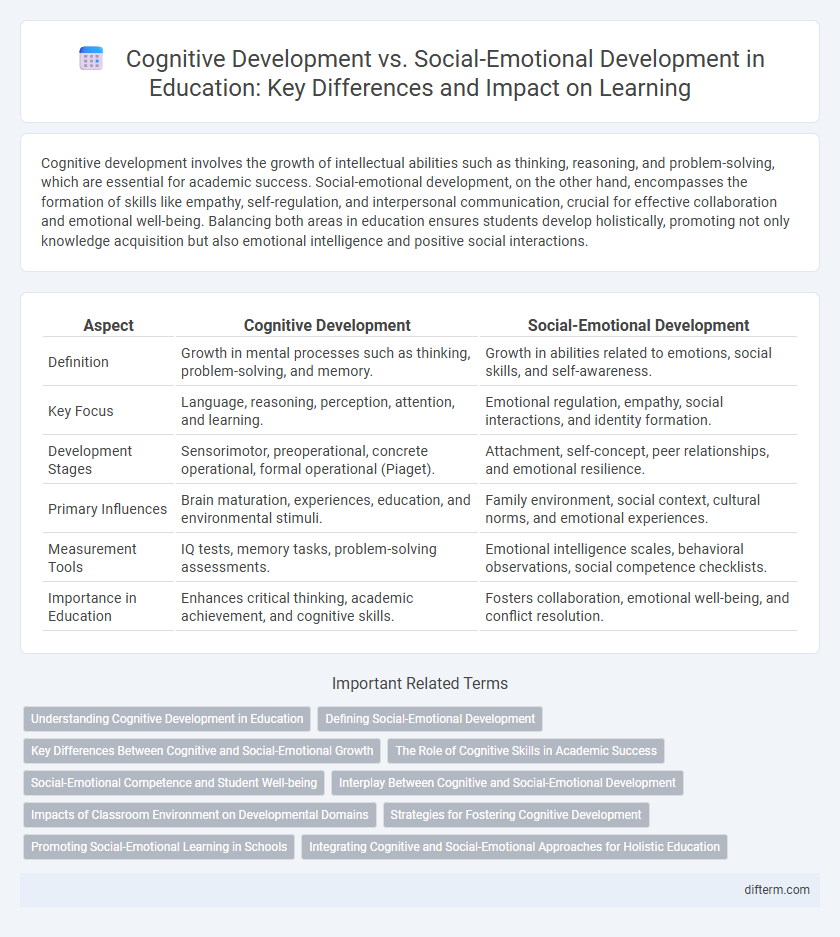Cognitive development involves the growth of intellectual abilities such as thinking, reasoning, and problem-solving, which are essential for academic success. Social-emotional development, on the other hand, encompasses the formation of skills like empathy, self-regulation, and interpersonal communication, crucial for effective collaboration and emotional well-being. Balancing both areas in education ensures students develop holistically, promoting not only knowledge acquisition but also emotional intelligence and positive social interactions.
Table of Comparison
| Aspect | Cognitive Development | Social-Emotional Development |
|---|---|---|
| Definition | Growth in mental processes such as thinking, problem-solving, and memory. | Growth in abilities related to emotions, social skills, and self-awareness. |
| Key Focus | Language, reasoning, perception, attention, and learning. | Emotional regulation, empathy, social interactions, and identity formation. |
| Development Stages | Sensorimotor, preoperational, concrete operational, formal operational (Piaget). | Attachment, self-concept, peer relationships, and emotional resilience. |
| Primary Influences | Brain maturation, experiences, education, and environmental stimuli. | Family environment, social context, cultural norms, and emotional experiences. |
| Measurement Tools | IQ tests, memory tasks, problem-solving assessments. | Emotional intelligence scales, behavioral observations, social competence checklists. |
| Importance in Education | Enhances critical thinking, academic achievement, and cognitive skills. | Fosters collaboration, emotional well-being, and conflict resolution. |
Understanding Cognitive Development in Education
Cognitive development in education involves the growth of mental processes such as thinking, problem-solving, memory, and language acquisition, which are essential for learning and academic achievement. It enables students to process information, apply logic, and develop critical thinking skills necessary for understanding complex subjects. Fostering cognitive development through targeted instructional strategies enhances students' ability to comprehend material deeply and retain knowledge effectively.
Defining Social-Emotional Development
Social-emotional development refers to the process through which children acquire the ability to understand and manage emotions, establish positive relationships, and develop empathy and self-regulation skills. This development influences their capacity to navigate social environments and respond adaptively to social interactions. It complements cognitive development by fostering emotional intelligence, interpersonal competence, and behavioral self-control, essential for overall well-being and academic success.
Key Differences Between Cognitive and Social-Emotional Growth
Cognitive development primarily involves the growth of intellectual abilities such as thinking, problem-solving, and memory, whereas social-emotional development centers on understanding emotions, building relationships, and developing self-regulation skills. Key differences include the focus on mental processes and knowledge acquisition for cognitive growth, compared to emotional awareness and interpersonal skills for social-emotional development. These developmental domains interact but target distinct aspects of a child's overall maturity and learning capacity.
The Role of Cognitive Skills in Academic Success
Cognitive skills such as memory, attention, and problem-solving are critical predictors of academic success, enabling students to process information effectively and apply knowledge across subjects. Research indicates that students with strong cognitive abilities demonstrate higher achievement in reading, mathematics, and science due to enhanced executive functioning. These skills support goal setting, self-regulation, and complex reasoning, creating a foundation for lifelong learning and intellectual growth.
Social-Emotional Competence and Student Well-being
Social-emotional competence plays a critical role in student well-being by enhancing students' ability to manage emotions, establish positive relationships, and make responsible decisions. Research shows that strong social-emotional skills correlate with improved academic performance, reduced behavioral problems, and better mental health outcomes. Schools implementing targeted social-emotional learning programs report significant improvements in students' resilience, self-awareness, and overall life satisfaction.
Interplay Between Cognitive and Social-Emotional Development
Cognitive development and social-emotional development are deeply interconnected, influencing a child's learning and overall well-being. Executive functions such as working memory, cognitive flexibility, and inhibitory control support social-emotional skills like empathy, self-regulation, and cooperation. Research shows that integrated educational approaches targeting both domains enhance academic achievement and positive peer relationships, highlighting the importance of nurturing this interplay in early childhood education.
Impacts of Classroom Environment on Developmental Domains
Classroom environments enriched with interactive learning materials and collaborative spaces significantly enhance cognitive development by stimulating critical thinking and problem-solving skills. Meanwhile, emotionally supportive settings that promote positive social interactions foster social-emotional development through improved communication, empathy, and self-regulation. Research indicates that balanced classroom designs that integrate both cognitive challenges and social-emotional support optimize overall developmental outcomes in early education.
Strategies for Fostering Cognitive Development
Targeted instructional methods such as scaffolding and problem-solving activities significantly enhance cognitive development by promoting critical thinking and memory retention. Integrating hands-on learning experiences encourages active engagement, facilitating neural connections essential for information processing and reasoning skills. Collaborative group projects stimulate cognitive growth by challenging students to negotiate, plan, and articulate ideas, thereby reinforcing executive function and cognitive flexibility.
Promoting Social-Emotional Learning in Schools
Promoting social-emotional learning (SEL) in schools enhances students' ability to manage emotions, establish positive relationships, and make responsible decisions, which supports holistic cognitive development. SEL programs integrated into curricula improve classroom behavior and academic performance by fostering emotional regulation and social skills. Implementing evidence-based SEL frameworks, such as CASEL's competencies, benefits students' mental health and long-term success, emphasizing the critical balance between cognitive and social-emotional growth.
Integrating Cognitive and Social-Emotional Approaches for Holistic Education
Integrating cognitive and social-emotional development enhances holistic education by fostering critical thinking alongside empathy and self-regulation skills. Research from the Collaborative for Academic, Social, and Emotional Learning (CASEL) demonstrates that programs combining these domains improve academic performance and interpersonal relationships. Educators implementing strategies that blend problem-solving tasks with social-emotional learning activities create well-rounded environments conducive to comprehensive student growth.
cognitive development vs social-emotional development Infographic

 difterm.com
difterm.com